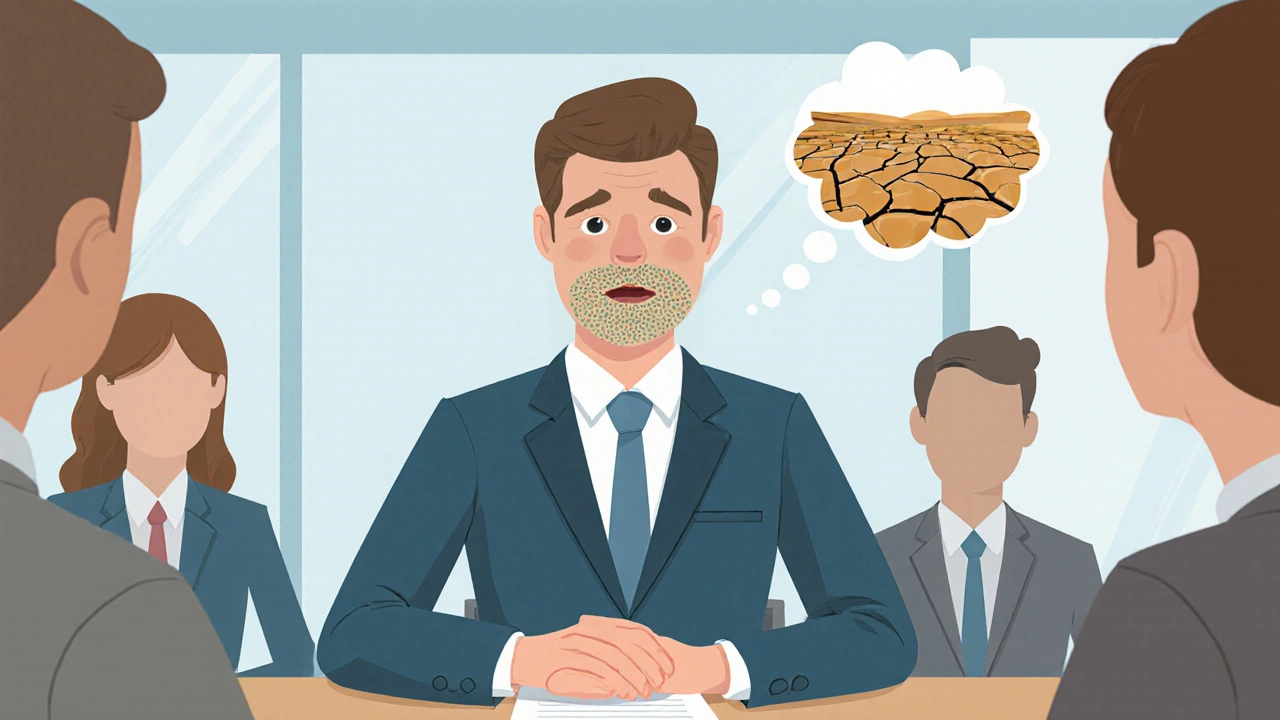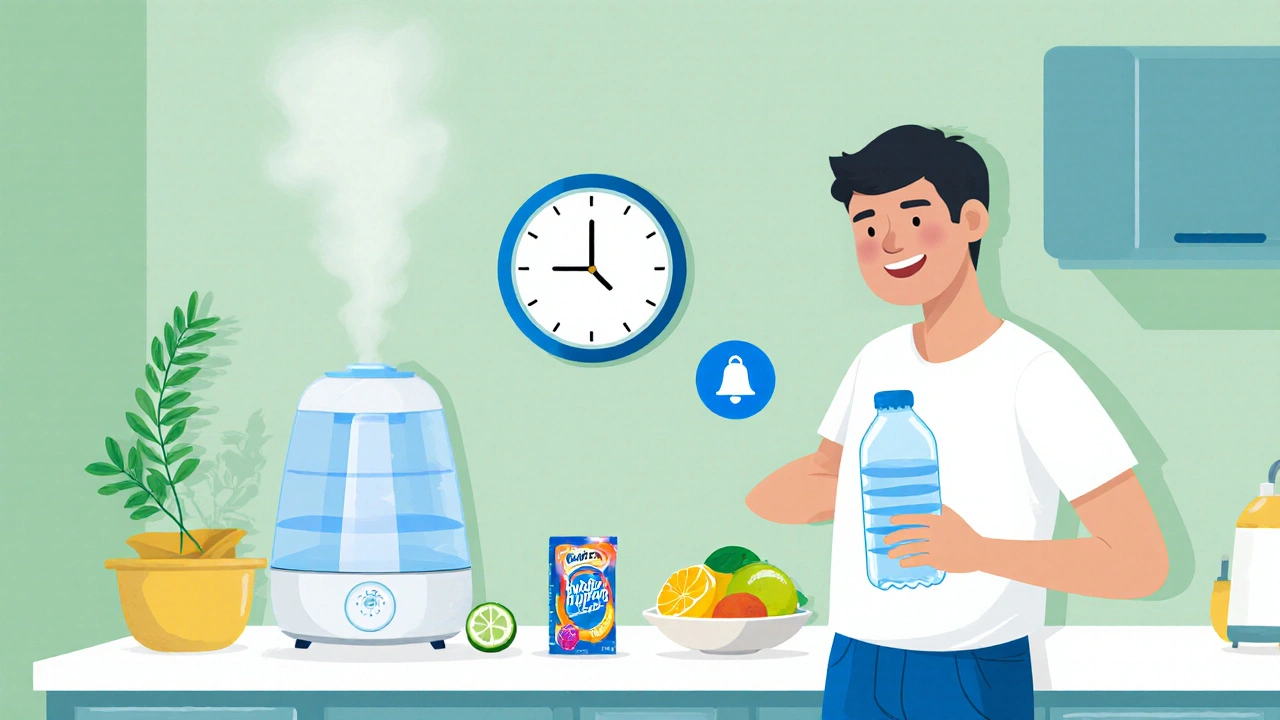Dry Mouth Symptoms: Spot Dehydration Early
 Oct, 20 2025
Oct, 20 2025
Dehydration Risk Assessment Tool
Dry Mouth & Dehydration Assessment
This tool evaluates your risk of dehydration based on dry mouth symptoms and lifestyle factors. Select the options that apply to you.
Ever walked into a meeting, opened your mouth to speak, and felt an unexpected sandpaper-like dryness? That moment could be your body’s silent alarm that it’s running low on water. Recognising the link between dry mouth and dehydration can stop a simple comfort issue from becoming a health problem.
What Exactly Is Dry Mouth?
Dry Mouth is the lay‑person term for the medical condition called xerostomia. It occurs when the salivary glands don’t produce enough saliva to keep the mouth moist. Saliva isn’t just water - it contains enzymes, antibodies, and minerals that protect teeth, aid digestion, and keep speech smooth.
How Dehydration Triggers Xerostomia
Dehydration is a state where the body loses more fluid than it takes in. When fluid levels drop, the body conserves water for vital organs, and the salivary glands are among the first to feel the pinch. The result? A noticeable reduction in wetness, a sticky feeling, or even a cracked tongue.
Key Signs That Your Mouth Is Thirsty
- Persistent dry or sticky feeling, especially after waking up.
- Thick, stringy saliva that’s hard to swallow.
- Difficulty chewing, swallowing, or speaking clearly.
- Bad breath that doesn’t improve after brushing.
- Increased thirst, yet drinking water doesn’t fully relieve the dryness.
- Red or cracked corners of the mouth (angular cheilitis).
If you notice two or more of these symptoms together, it’s worth checking whether you’re dehydrated or have an underlying condition.
Common Causes Beyond Simple Thirst
| Cause | Dehydration‑Related? | Typical Symptoms |
|---|---|---|
| Insufficient fluid intake | Yes | Thirst, low urine output, dry skin |
| Medications (antihistamines, diuretics) | Often yes - they increase fluid loss | Dry mouth, dizziness, frequent urination |
| Sjogren’s syndrome | No | Chronic dry eyes, joint pain, persistent xerostomia |
| Diabetes (uncontrolled) | Both - high blood sugar draws water from tissues | Frequent urination, blurred vision, dry mouth |
| Radiation therapy to head/neck | No | Severe saliva reduction, difficulty swallowing |
Who’s Most at Risk?
Understanding who is prone to dry mouth helps you spot the warning signs early:
- Elderly adults - they often drink less and take more medications.
- People who exercise heavily in hot climates without replacing fluids.
- Individuals on antihistamines, antidepressants, or blood pressure pills.
- Patients with diabetes, kidney disease, or autoimmune disorders like Sjogren’s syndrome.
- Those who consume alcohol or caffeine in large quantities.
Self‑Assessment: Quick Check‑Up for Dry Mouth
- Drink a glass of water. Wait five minutes.
- Notice if the dryness eases. If it persists, log the feeling.
- Count how many times you need to sip water in an hour. More than eight sips may indicate dehydration.
- Check your urine colour. Dark amber is a classic dehydration flag.
- Inspect your mouth for cracks or sores. Persistent lesions need a professional look.
Keep a simple diary for a few days. Patterns will reveal whether fluid loss or another factor is at play.
When to See a Healthcare Provider
Most dry‑mouth episodes resolve with better hydration, but certain signs warrant a medical visit:
- Dryness that lasts more than two weeks despite drinking water.
- Frequent mouth infections, cavities, or gum disease.
- Difficulty swallowing foods or medications.
- Unexplained weight loss or persistent bad breath.
- Any new medication that coincides with the onset of symptoms.
Doctors might order blood tests for glucose, electrolytes, or autoimmune markers, and they may refer you to a dentist for oral health evaluation.

Practical Ways to Beat Dry Mouth and Stay Hydrated
- Sip, don’t gulp. Small, frequent sips keep the mouth moist without overloading the kidneys.
- Choose water or electrolyte‑balanced drinks. Coconut water or low‑sugar sports drinks replace lost salts.
- Avoid alcohol, excess caffeine, and sugary sodas-they dry out tissues.
- Chew sugar‑free gum or suck on lozenges containing xylitol. The act of chewing stimulates saliva production.
- Use a humidifier at night, especially in dry climates or heated homes.
- Carry a portable water bottle and set reminders on your phone to drink.
Special Considerations for Specific Groups
Saliva composition changes with age. Older adults benefit from fluoride‑rich mouth rinses to protect teeth when saliva is low. Athletes training in hot environments should aim for a 0.5‑liter fluid replacement per hour of intense activity. Those on diuretics may need an extra 250 ml of water for each dose.
FAQ - Dry Mouth and Dehydration
Can I get dry mouth without being dehydrated?
Yes. Certain medications, autoimmune diseases, and radiation therapy can shrink salivary glands or alter saliva quality, leading to xerostomia even when fluid levels are normal.
How much water should I drink to prevent dry mouth?
The general recommendation is about 2 liters (8 cups) per day for adults, but personal needs vary based on activity, climate, and health status. Monitoring urine colour is a quick self‑check.
Are there home remedies that actually work?
Chewing sugar‑free gum, sipping water regularly, and using a humidifier are proven to boost oral moisture. Over‑the‑counter saliva substitutes (gel or spray) can also provide temporary relief.
When should I be concerned about a more serious condition?
If dry mouth lasts more than two weeks, is accompanied by frequent infections, or you notice unexplained weight loss, schedule a medical appointment. These could signal diabetes, Sjögren’s syndrome, or kidney issues.
Can diet influence dry mouth?
Yes. High‑salt foods increase the body’s demand for water, while acidic or spicy meals can irritate a already dry mouth. A balanced diet rich in fruits, vegetables, and whole grains supports overall hydration.
Bottom Line Checklist
- Drink water frequently; aim for clear, pale urine.
- Watch for the six key dryness symptoms listed above.
- Identify any medications or health conditions that could be culprits.
- Use saliva‑stimulating tools like sugar‑free gum.
- Seek professional help if symptoms persist beyond two weeks.
By staying aware of these signals, you turn a simple thirst cue into a proactive health habit. Your mouth will thank you, and your whole body stays better hydrated.

Ron Lanham
October 20, 2025 AT 21:18We cannot overlook the stark reality that dehydration is a silent aggressor, gnawing at our health while we pretend everything is fine. The body alerts us with dry mouth, yet many dismiss it as a minor inconvenience. This dismissal is not just careless; it borders on irresponsibility toward one's own well-being. Saliva is a critical component of oral health, containing enzymes that protect against decay and infection. When we neglect the warning signs, we invite cavities, gum disease, and systemic issues that could have been prevented with simple water intake. Moreover, the modern lifestyle glorifies caffeine and alcohol, both of which exacerbate fluid loss, creating a vicious cycle of dehydration. It is morally imperative to prioritize hydration as a daily ritual, not an afterthought. We must educate ourselves and those around us about the simple act of sipping water regularly. The habit of gulping a large glass once a day is insufficient; steady, small sips keep the salivary glands functioning optimally. Ignoring the evidence presented by medical literature is a disservice to ourselves and to society. Each individual holds the responsibility to monitor urine color, mouth dryness, and overall fluid balance. The consequences of ignoring these signals extend beyond bad breath; they affect cognitive function and physical performance. In workplaces, schools, and homes, we should advocate for accessible water sources and encourage frequent hydration breaks. This is not a trivial suggestion; it is a fundamental public health measure. The moral high ground belongs to those who take proactive steps, rather than those who wait for severe symptoms to appear. Let us all commit to recognizing dry mouth as a red flag, and act accordingly before it spirals into a larger health crisis.
Mahesh Upadhyay
October 22, 2025 AT 09:32Dry mouth is a dire omen you cannot simply brush off.
Rajesh Myadam
October 23, 2025 AT 21:46I hear you, and I’ve been there feeling that gritty throat in the middle of a busy day. It’s understandable to feel frustrated when the simple act of drinking water seems insufficient. Your body is trying to tell you something, and acknowledging that feeling is the first step toward improvement. Try keeping a small bottle beside you, and take a sip whenever you notice that sandpaper sensation. Over time, you’ll likely notice the dryness fading as your hydration habits become more consistent. Remember, small, frequent sips are kinder to your kidneys than large gulps.
Andrew Hernandez
October 25, 2025 AT 10:00Hydration is a universal need water is essential for every culture and lifestyle and keeping a bottle handy can bridge the gap between thirst and health
Alex Pegg
October 26, 2025 AT 21:14While the post praises water, it ignores that many people thrive on beverages with electrolytes and that the singular focus on plain water can be overly simplistic.
laura wood
October 28, 2025 AT 09:28It can be overwhelming when your mouth feels like sandpaper, especially after a long shift. Knowing that a simple habit like a water bottle nearby can make a difference is empowering. Try pairing water with a hint of citrus or mint for a refreshing boost without adding sugar.
Kate McKay
October 29, 2025 AT 21:42Think of your mouth like a garden; it needs regular watering to stay healthy. Start with a small goal-maybe three sips each hour-and watch how the dryness recedes. Celebrate each successful day; consistency builds confidence and keeps your oral health on track.
JessicaAnn Sutton
October 31, 2025 AT 09:56The pathophysiology of xerostomia extends beyond mere fluid deficit; it encompasses neurogenic modulation of salivary gland output, receptor sensitivity, and systemic homeostatic mechanisms. Consequently, attributing every dry mouth episode to dehydration oversimplifies a complex clinical picture. A nuanced assessment must consider medication profiles, autoimmune markers, and metabolic panels to delineate etiology with precision.
Israel Emory
November 1, 2025 AT 22:10Indeed, the literature, however, shows, that while electrolyte‑rich solutions can augment hydration, the primary recommendation remains consistent water intake, yet individual variability-age, activity level, climate-demands personalized strategies; thus, clinicians should tailor advice, not enforce a one‑size‑fits‑all protocol.
Sebastian Green
November 3, 2025 AT 10:24I’ve found that keeping a low‑key reminder on my phone helps me sip water without feeling pressured.